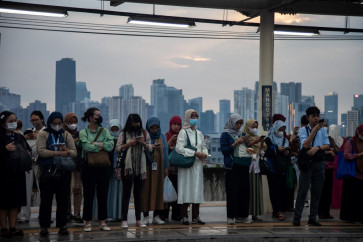Popular Reads
Top Results
Can't find what you're looking for?
View all search resultsPopular Reads
Top Results
Can't find what you're looking for?
View all search resultsEating on a prayer
Thirty-year-old Siska Maria Eveline confessed that she had almost given up ordering dishes containing vegetables in numerous restaurants across Jakarta
Change text size
Gift Premium Articles
to Anyone
Thirty-year-old Siska Maria Eveline confessed that she had almost given up ordering dishes containing vegetables in numerous restaurants across Jakarta.
'Ordering a vegetable dish for your meal is almost a sure way to get worms on your plate,' Siska said in frustration because she cannot order her favorite dish of cap cay (sauteed vegetables) easily in the city. 'I have a 50 percent chance of finding a worm ' if not more ' on the broccoli.'
Siska has stopped gambling with her food and chooses to order hard-boiled dishes for her meals. 'At least if I find a worm I know it's fully-cooked,' she said with a bitter laugh.
Arie Novarina, who regularly eats out for lunch and dinner, observed that service hygiene was directly correlated to the price she has to pay ' the more expensive the place, the better hygiene they have.
'At a middle- to lower-end restaurant, I pray harder before eating my meals,' said the 32-year-old worker, whose office is in the downtown area of Jl. Sudirman in Central Jakarta.
However, she said, in general, there was little awareness of service and food hygiene among Jakartans ' both food businesspeople and consumers. 'It's not yet part of our culture and knowledge,' Arie says.
As the epicenter of urban culture and lifestyle, the capital city has seen rapid food business development in the past few years.
According to data from the Central Statistics Agency (BPS), the number of middle- and big-scale restaurants in Jakarta has almost doubled from a total of 720 in 2007 to 1,361 in 2011.
The growth, however, is not complemented by rigorous supervision over the restaurants, bars, eateries and cafeterias, which according to the Jakarta administration, there were more than 3,500 of them in 2012.
The administration has admitted that it does not have health and food inspectors or adequate regulations for restaurants. The Jakarta Tourism Agency and the local branch of the Indonesia Hotels and Restaurants Association conduct hygiene inspections only before business permits are issued or are renewed once every three years.
According to a 2011 Health Ministerial Regulation on Food Service Hygiene Sanitation, food service establishments need to secure a hygiene sanitation certificate from the regional administration as part of their business permits. The regulation mandates that inspectors from regional administrations check on building, tools, employees, food ingredients and food production process.
The Jakarta Health Agency says it has the authority to inspect the hygiene of restaurants every six months, but lacks the manpower to do so.
Agency head Dien Emmawati admitted earlier this year that it was unable to crack down on rodent-infested restaurants ' saying it could only 'encourage owners to raise their awareness and to call a pest exterminator'.
An unclear and confusing system also made healthy food chef and restaurateur Edwin Lau decided to implement a system of his own at his restaurant. 'I don't want to take a risk with a system that is going nowhere so I implement a system that I have researched on my own and believe to be appropriate for the restaurant and kitchen I'm running,' Edwin said.
The chef said people in the culinary field had yet to be convinced that the government had put up a professional hygiene and sanitation standard for restaurants.
Roy Sparringa, chairman at the Food and Drug Monitoring Agency (BPOM), admitted the government had yet to implement
a rigorous food safety management system based on hazard analysis and critical control points (HACCP).
'We need to do that in the future and we will do that,' Roy said.
He added the BPOM and the Health Ministry had continued to provide training on food inspection at regional administrations.
'The government, however, cannot do all of this alone. This has to be done together with support from food businesspeople and also the consumers,' he said.










